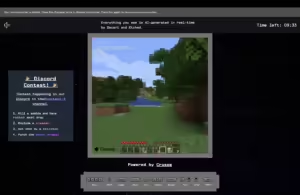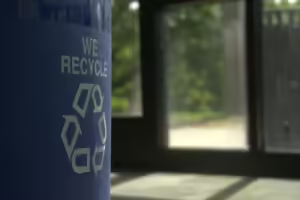Through agricultural bio-technology innovation and industry standard practices, Tyler Hacking aims to redefine how we perceive recycling and sustainability.
When most people think of recycling or sustainability, worms are not typically the first thing that comes to mind. However, a population of about 4 million worms plays an integral part in Tyler Hacking’s effort to redefine the way our university considers sustainability.
Hacking is a UVU Alumni with an associate’s degree in biology and a bachelor’s in botany. Most of his research is focused on soil microbiology and environmental chemistry. He participates as a mentor in the UVU Alumni job shadow program and gives presentations on sustainable agriculture biotechnologies. Last year, he taught for UVU’s community education program on “Soil to Body Nutrition.”
After graduating from UVU in 2022 with his bachelors, Hacking set out to build the UVU Compost Program to show that the university can mitigate costs of water use, fertilizer and HR labor associated with replacing grass and trees on campus. Each of these are expenditures for the university.
The UVU Compost program focuses on mitigation of these costs by providing sustainable alternatives and solutions to each issue, recycling materials to create compost and soil for UVU. What makes this unique is that the materials recycled to make the compost come directly from the university and its services.
Hacking obtains food waste from the UVU Culinary Art Department, dining services, and Chef Todd’s UVU restaurant “Forte” such as fruit or vegetable waste. He gets old newspapers from the UVU Review, cardboard from the facilities department, and coffee grounds from Starbucks. He collects leaves, grass clippings, pine needles, and wood from the UVU grounds department. Most of these waste materials would normally be thrown away, but Hacking uses them to build environments for his large community of worms, bacteria, and fungi.
The worms then gradually turn the waste into vermicompost. Vermicompost is a nutrient-rich soil ingredient made from organic waste that has been broken down by worms. Other than the worms, the entire program is completely vegan and uses no animal products.
After the food has decomposed into vermicompost, Hacking uses the vermicompost to create soil for the university, providing nutrients and improving plant health across campus. The soil is produced by blending different soil substrates like vermicompost, coco coir, peat moss, vermiculite, and perlite at varying ratios for different applications.?
Not only are campus grounds improved by Hacking’s soil, but the water in the sprinklers is as well. Hacking dissolves a water-soluble vermicompost into a cell culture system called compost tea aquaculture where one handful of vermicompost mixed with equal parts of minerals, carbohydrates, and sugar are brewed for 12-48 hours into a liquid living probiotic full spectrum fertilizer with mineral amendments all in one, once this concentrated product is finished brewing, it is then injected into the UVU sprinkler system. This naturally enriches the water with minerals and nutrients once more for the plant life and reduces the amount of water that the university must spend to keep the grass and trees alive year-round because it changes the physical texture and structure of the soil, making it more water and nutrient absorbent, this creates an ideal home for symbiotic bacteria and fungi which contribute to plant health and nutrition.
The UVU Compost program is in-house (run on-campus) and shows that UVU can work smarter instead of harder to achieve our sustainability goals to mitigate our waste output and recycle effectively.
The program’s efforts provide a better, sustainable alternative to simply throwing away our trash and our left-over peels. And it provides a more natural method to maintain plant life than replacing a tree or grass every year.
According to Hacking, “Once applied to the entire university, these technologies have the potential to mitigate up to 20% of the university outdoor water use, mitigate up to 40% of the university waste disposal needs and mitigate purchase of soil associated materials by 40%.”
If anyone has questions pertaining to the program, reach out to Hacking at Microsoft teams, the UVU directory or any social media platform.










